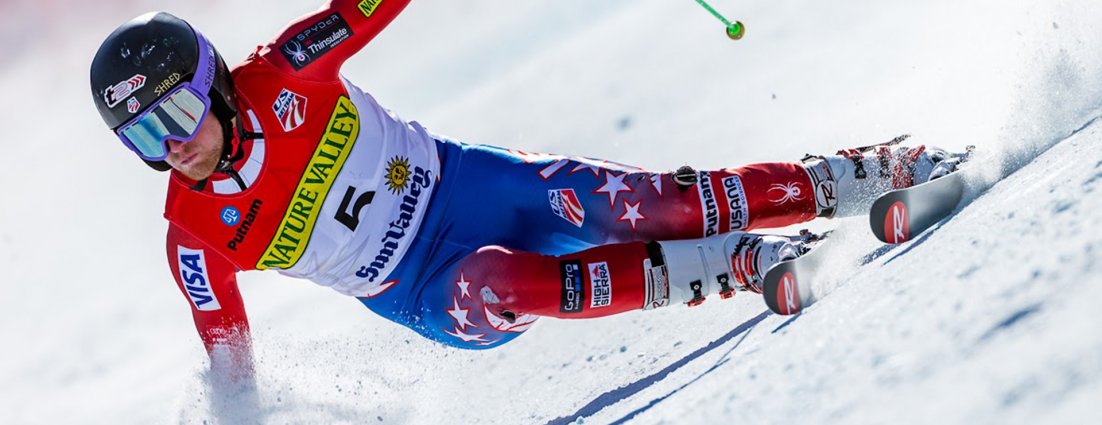The Psychology Of Ski Racing
02.28.2021 | Ryan Cochran-Siegle

When I finally stopped putting pressure on myself to be the best and flipped my perspective to becoming my best, racing became enjoyable again.
In Abraham Maslow’s “hierarchy of needs,” the bottom tier of the pyramid represents our most basic human needs—physiological needs (like food and shelter) and safety and belonging needs (like security and relationships). Above these needs, at the top of the pyramid, lies the need for self-actualization. SiMaslow describes the path to self-actualization as unique to one’s identity, dependent on infinite combinations of internal and external conditions.
For me, some of the conditions that contributed to my journey to fulfillment included growing up in a ski racing family, having an inherently competitive nature, and generally loving the outdoors. These factors have led to my love of ski racing—my outlet for creativity and competition and the closest thing I’ve felt to self-actualization. While this discovery has taken a lifetime to understand, there have been glimpses of it from the start, like a sprouting seed beneath the surface.
In the beginning, skiing was only about having fun; there was no direction needed outside of that. I gained an immediate longing for the sport—chasing the thrill of passing gates and angulated edges, testing my limits. It didn’t take long before I found myself a part of the Cochran’s Ski Club, chasing the bigger kids through tree glades and training courses. Once the clock was added to the equation there was additional complexity—another obstacle for us to overcome.
My underlying driving force eventually changed from the elementary love of immediate reward and developed into the appreciation for delayed gratification based on long-term development. As long as I knew that what I was doing would benefit me as a skier in the long run, I could find myself satisfied in the pursuit. I soon experienced a nearly equal amount of joy whether I was exploring a new groomer trail or breaking the will of a gate in my way. When things didn’t immediately go my way, I learned to get over my perceived failure, process it, and use it as motivation to be better next time. I became a fierce competitor at nearly every age level, with my primary goals set on winning.
As it turns out, I was also learning some of life’s most valuable lessons on humility, dedication, and determination—character traits far more important in life than any particular acquisition of skill. Like other adolescents my age, I unfortunately viewed fame and fortune as the most important thing towards which to strive, and I connected ski racing results with the path to get there.
In the early years of adulthood, I started using this superficial drive as my main motivator, turning ski racing into a career with my livelihood quickly becoming dependent on it. This mindset invoked a pressure to perform, with a failure of doing so as a direct conflict to my perceived self-identity. In my head it made sense that making money by winning World Cups and the Olympics would be enough to solve any of life’s other problems, especially having come from a place with relatively little means. My love for ski racing was tested. By only focusing on the material relationship, I wasn’t appreciating the true value that ski racing gave me, and my ability to perform was stunted for years.
However, after spending enough time around people with the very highest of accolades and accomplishments I gained perspective that these things are not of high importance. There is no cheat code you plug in to reach a constant state of happiness, no matter how great your financial or social wellbeing. Likewise, the alternative to this type of success does not make you a failure either. The only important piece to take away is to learn from these experiences, both good and bad, and move forward with them. It is in these moments—the time spent absorbing information, juggling a concept around tirelessly in your head trying to figure it out, and ultimately putting it down on paper (for me, translating it into my skiing)—that you grow. These are the vital moments for which we should search.
I learned to ski at the age of 2, began ski racing when I was 5, made the U.S. Ski Team at 18, and raced my first World Cup at 19. It has been only within the past three years that I realized the importance of having a direction of substance. When I finally stopped putting pressure on myself to be the best and flipped my perspective to becoming my best, ski racing became enjoyable again. I got back to my roots of having fun with the process, getting in tune with my surroundings, being honest about my strengths and weaknesses, and taking ownership in everything—my successes and failures equally.
In retrospect, I see ski racing has all along been my path to success and happiness, but not even remotely like how I had once envisioned. I redefined my version of success to mean having the drive to grow every day, having the ability to face any kind of adversity head-on, having the self-awareness to be present, and having the resolve to do it all with a smile on my face. Though my perspectives may change over time, ski racing will always be this outlet for me. In this way I have had the great privilege of pursuing self-actualization and enjoying the process.
-